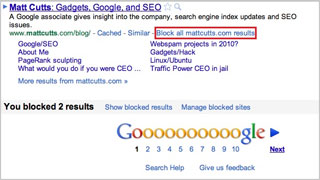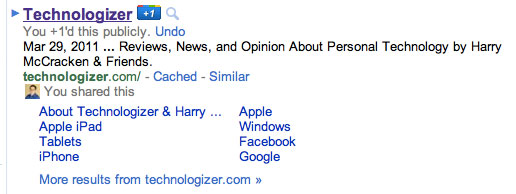I’m at Qualcomm’s Uplinq conference, not the Wall Street Journal’s D9–but I’m monitoring the news from there, too. One of this morning’s D9 guests was Twitter CEO Dick Costolo, who announced a new, improved search feature and (as expected) a photosharing service in partnership with Photobucket. The latter new feature is arriving “over the next several weeks.”
Tag Archives | Search Engines
Is Traditional Search Passé?
 Microsoft Bing chief Stefan Weitz made a pretty significant pronouncement in an interview with The Huffington Post on Wednesday: search as we know it is dead. That’s quite the statement.
Microsoft Bing chief Stefan Weitz made a pretty significant pronouncement in an interview with The Huffington Post on Wednesday: search as we know it is dead. That’s quite the statement.
In simplest terms, the old fashioned way of search results being nothing much more than a list of returned links just isn’t cutting it — a business model that’s made Google a ton of money.
Lets be fair, though: Bing isn’t that much better. In both cases the two search engines have focused their efforts on “the social,” hoping that is the answer. Google’s social search solution is +1, which gives greater weight to returned results that people in a user’s social circle may have liked. Microsoft is doing something similar, but in that case their using content culled from a friend’s Facebook stream.
7 comments
Bing Adds Facebook Social Features

Microsoft’s search site Bing just got a whole lot more social with the addition of a bunch of new Facebooky features so you can “bring the Friend Effect to search” (Bing’s phrase, not mine).
What’s the Friend Effect? According to Bing, it’s the way that “90 per cent of people seek advice from family and friends as part of the decision making process.”
2 comments
Bing + Yahoo = Search Success?
 While at first some of us (myself included) may have looked at Microsoft’s deal last August to power Yahoo searches with skepticism, the move may finally be paying off–and could be eating into Google’s dominance in search.
While at first some of us (myself included) may have looked at Microsoft’s deal last August to power Yahoo searches with skepticism, the move may finally be paying off–and could be eating into Google’s dominance in search.
Hitwise found in March that the two sites combined now account for 30.01% of all searches in the US, up about a point and a half from the previous month. Google on the other hand dropped, moving from 66.69% to 64.42%, indicating that the people who weren’t using it were likely headed to Bing.
What’s behind this change? It could be that Microsoft’s algorithms are doing a better job at finding what searchers want. Experian Hitwise — who provided this data — found that on Yahoo and Bing, about 81 percent of all searches resulted in a visit to a website. Compare this to Google, which is significantly lower at 65 percent of all queries.
Could it really be that Bing just has a better handle on search? Sounds like Internet blasphemy (Google even accused Microsoft of stealing its search results) but that really could be the case. Microsoft has been hard at work behind the scenes making changes, and it’s clear it’s serious about becoming a player.
I’m still a Google guy, but hey technology changes fast, and that might not always be the case. Go ahead Bing, impress me…
4 comments
Google Has an Answer to Facebook’s Like Button. Now All It Needs is an Answer to Facebook
 For months, rumor has had it that Google was working on some big social project called +1. Now it’s not a rumor: Google has officially announced it as an “experiment” which it’s rolling out slowly and explained how to try it out. And it turns out that +1 is very much like Facebook’s Like button–a one-click method of expressing your approval of something on the Web in a way that’s relayed both to your friends and to the Internet at large. It’s launching on Google search results–and the ads on Google search results–and will apparently pop up on other Google products and other sites in the months to come. Just like the Like button.
For months, rumor has had it that Google was working on some big social project called +1. Now it’s not a rumor: Google has officially announced it as an “experiment” which it’s rolling out slowly and explained how to try it out. And it turns out that +1 is very much like Facebook’s Like button–a one-click method of expressing your approval of something on the Web in a way that’s relayed both to your friends and to the Internet at large. It’s launching on Google search results–and the ads on Google search results–and will apparently pop up on other Google products and other sites in the months to come. Just like the Like button.
I just gave a +1 to a site I like:
In principle, I like the idea of +1–especially if it’s spamproof, and especially if Google starts to use +1 ratings to rejigger search results in a useful way, something which I assume it’ll do sooner or later.
2 comments
The Technologizer Googlecount for March 2011
 Time for an occasional new Technologizer feature. For no other reason except that it’s fun, let’s look at the world–and especially the tech world–as reflected in the results for various Google searches. With apologies, as always, to Harper’s Index, here’s the Technologizer Googlecount.
Time for an occasional new Technologizer feature. For no other reason except that it’s fun, let’s look at the world–and especially the tech world–as reflected in the results for various Google searches. With apologies, as always, to Harper’s Index, here’s the Technologizer Googlecount.
3 comments
Google a Target of Antitrust Inquiries From Three States
![]() Is Google about to head down the same path that Microsoft took more than a decade ago? It could be. Bloomberg is reporting that sources with the Ohio and Wisconsin governments indicate that the first steps have been taken to investigate whether an antitrust inquiry is necessary. Authorities in Texas–the first state to launch antitrust action against Microsoft 14 years ago–are also questioning the search-engine giant.
Is Google about to head down the same path that Microsoft took more than a decade ago? It could be. Bloomberg is reporting that sources with the Ohio and Wisconsin governments indicate that the first steps have been taken to investigate whether an antitrust inquiry is necessary. Authorities in Texas–the first state to launch antitrust action against Microsoft 14 years ago–are also questioning the search-engine giant.
In Texas, the question is whether or not Google is manipulating search results to benefit its own properties. Wisconsin’s questions surround its efforts to purchase ITA Software, which produces software for the airline and travel industries. The article did not say what Ohio officials might be looking at.
No comments
Yahoo Goes for Instant Results With Search Direct
![]() I’m not a huge fan of Google Instant, mainly because it seems more gimmicky than anything. Well, Yahoo’s jumping on the instantaneous results bandwagon, debuting a product called Yahoo Search Direct. Like Instant, it will instantly cull its (or should we say Bing’s) database for results. There’s a difference here however, and Yahoo might actually be on to something.
I’m not a huge fan of Google Instant, mainly because it seems more gimmicky than anything. Well, Yahoo’s jumping on the instantaneous results bandwagon, debuting a product called Yahoo Search Direct. Like Instant, it will instantly cull its (or should we say Bing’s) database for results. There’s a difference here however, and Yahoo might actually be on to something.
Go to search.yahoo.com and try it out. For example, type in the query “philadelphia weather.” Once Search Direct figures out that is what you are looking for, a brief summary for the forecast appears next to the suggested terms. It works for other types of queries, such as “LeBron James”. Entering his name pops up his current season stats.
Yahoo’s effort here is to match its users with “answers, not links,” kind of like an Ask Jeeves on steroids. There might be a chance depending on what you’re looking for that you would never have to leave Yahoo’s site.
Google is doing something similar at times with Instant, but at least in my use it seems Yahoo’s a little quicker on the draw. Right now about 15 different types of searches will give those instant results — weather, sports, music, and news are just some — but Yahoo says this eventually could span hundreds of categories.
The company will also monetize the feature by allowing for advertisers to embed an ad for select queries. For example, searchers for “Target” could be presented with the current video advertisement in that pane much like the weather forecast or sports statistics appear.
Go ahead and try it. Do you think it’s better than Instant? Let us know in the comments.
No comments
All the Web No More
There was a brief period–gosh, maybe ten years ago?–when All the Web was my favorite search engine. In fact, I steadfastly believed it was better than Google. Then it had a sad decline. And now it’s apparently going away.
TV shows occasionally call it quits when they’re still on top–Mary Tyler Moore, Seinfeld, The Sopranos. Why is it that every good Web site goes through a sad decline?
6 comments
Hate a Website? Block It From Google
 About a month ago, Google launched a Chrome browser extension that let users hide specific domains from search results. Soon, that feature will be available in multiple web browsers — no extension required.
About a month ago, Google launched a Chrome browser extension that let users hide specific domains from search results. Soon, that feature will be available in multiple web browsers — no extension required.
The option to block websites from Google search results is rolling out on Friday for users of Chrome 9 and higher, Internet Explorer 8 and higher, and Firefox 3.5 and higher. Next to each search result, users will see a snippet of text that reads “block all example.com results.” Click it, and you’ll never see that domain on Google again.
To use the feature, you’ll have to be signed in to a Google account. This allows you to manage a list of blocked sites from search settings. Whenever a result is blocked from search, a notification will appear, so you can still view results from blacklisted domains on a case-by-case basis.

